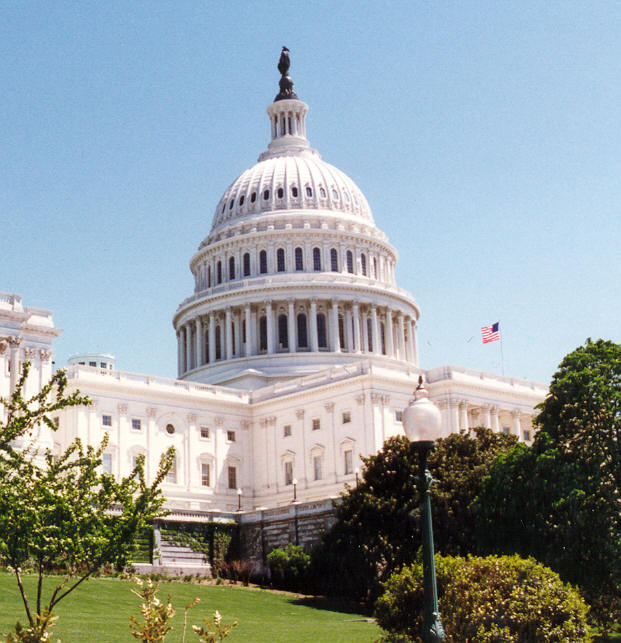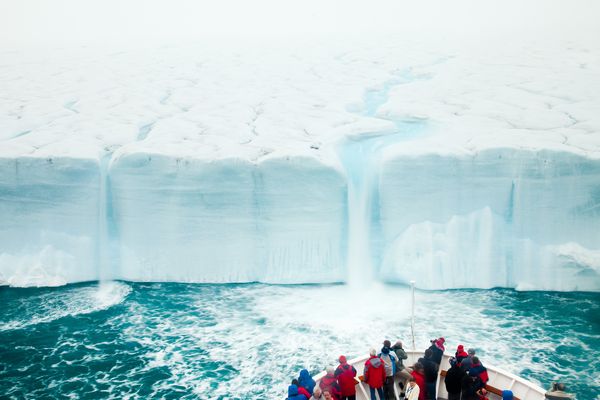|
|
|
|
|
|
|
|
Towing Safety Advisory Committee, October 2016 Meeting, October 26-27, 2016 (Washington, DC USA). The Towing Safety Advisory Committee will meet in Washington, DC, to review and discuss recommendations from its Subcommittees and to receive briefs. This committee is established in accordance with, and operates under the provisions of, the Federal Advisory Committee Act. As stated in 33 U.S.C. 1231a, the Towing Safety Advisory Committee provides advice and recommendations to the Department of Homeland Security on matters relating to shallow-draft inland and coastal waterway navigation and towing safety.
Fulbright Arctic Week. October 25-27 (Washington, DC). The 18-month Fulbright Arctic Initiative supports U.S. priorities on Arctic issues and increasing mutual understanding between Americans and those in other countries. As a culmination of the program, 17 scholars will be presenting their work at public events. Other invited speakers will include officials from the Inuit Circumpolar Council, Arctic Executive Steering Committee, and U.S. Arctic Youth Ambassadors, among other. For more information, please visit the Fulbright Arctic Week website and/or register your interest for updates.
October 27, 9am-4:30pm - Fulbright Arctic Symposium at the National Academy of Sciences (Constitution Ave. location)
Today's Congressional Action:
The House and Senate are not in session.
|
Media
Super-Cold Winters in the UK and US are Due to Arctic Warming. An indirect effect of climate change may be causing intensely cold winters in the UK and US, a study suggests. Warming in the Arctic is thought to be influencing the jet stream, a high-altitude corridor of fast-moving air, leading to severe cold snaps. It may have been responsible for record snowfall in New York during the winter of 2014/15, and unusually cold winters in the UK in 2009/10 and 2010/11. New Scientist
 Historic US Senate Debate in Barrow Focuses on the Arctic. Historic US Senate Debate in Barrow Focuses on the Arctic. Organizers billed it as the first ever U.S. Senate debate held above the Arctic Circle. Sen. Lisa Murkowski faced three challengers on the stage at the Barrow High School auditorium on Wednesday. But even before the candidates had a chance to engage, there was a distinctly different flavor to this debate, which began with a prayer in the Iñupiat language, followed by the Pledge of Allegiance, also recited in Inupiaq. The candidates sparred on a wide range of issues that have been mostly overlooked in other debates - the impact of the Endangered Species Act on whaling quotas, the lack of ports and infrastructure, the growing Russian military threat to the Arctic and the impact of climate change on subsistence living. KTVA
White House Signals Arctic Support Ahead of Lease Sales. The White House is signaling interest in continued oil and gas development in the Arctic region, with two Obama administration officials backing offshore energy exploration in speeches at an Atlantic Council conference this week. At the same time, the Bureau of Land Management is planning a Dec. 14 lease sale in the National Petroleum Reserve in Alaska. That sale will be held on the same day that the Alaska Department of Natural Resources offers state-owned lands for oil and gas leasing on the North Slope and in the Beaufort Sea. E&E News
Arctic Indigenous Leaders Meet IMO Secretary-General. In the first meeting of its kind, a wide-range of issues surrounding climate change and the subsequent increase in number of ships operating in arctic waters were discussed. Secretary-General Lim outlined IMO's work in this field, in the form of IMO's Polar Code, which will enter into force in January 2017. The Code applies to ships operating in Arctic and Antarctic waters, provides for safe ship operation and protects the environment by addressing the unique risks present in polar waters but not covered by other treaties. Marine Link
 Arctic Yearbook: Alternative Medium. Arctic Yearbook: Alternative Medium.
If there is one thing that Heather Exner-Pirot and Joël Plouffe want you to know, it is that you shouldn't believe everything you google about the Arctic. They are in a good position to know: in addition to their day jobs as academics focusing on issues related to the North, they moonlight as co-managing editors of the Arctic Yearbook, which will see its fifth edition released tomorrow. A pre-release event in Ottawa the same day is being sponsored in part by the Canadian foreign ministry. Arctic Journal
|
Legislative Action.gif)
No Arctic legislation was formally considered yesterday.
|
|
Future Events
1st International Muskox Health Ecology Symposium, November 7-10, 2016 (Calgary, AB Canada). The goal of this symposium is to share knowledge on muskox health ecology and sustainability across a variety of international stakeholders including community members/users, industry, wildlife management, and academia. We will discuss: the values, ecological, economic, social and cultural, of muskoxen; population status and trends; threats, vulnerabilities and resilience or sustainability; knowledge gaps; disease ecology; and existing and new tools for muskox health monitoring and research. For more information, please contact Susan Kutz.
ArcticNet annual Scientific Meeting 2016, December 5-9, 2016 (Winnipeg, MP Canada). ArcticNet will host its 12th Annual Scientific Meeting. The ASM2016 will welcome researchers, students, Inuit, Northerners, policy makers and stakeholders to address the numerous environmental, social, economical and political challenges and opportunities that are emerging from climate change and modernization in the Arctic. As the largest annual Arctic research gathering held in Canada, ArcticNet's ASM is the ideal venue to showcase results from all fields of Arctic research, stimulate discussion and foster collaborations among those with a vested interest in the Arctic and its peoples.
American Geophysical Union Fall Meeting, December 12-16, 2016 (San Francisco, CA USA). Anticipating about 25,000 attendees, AGU's Fall Meeting will again be the largest Earth and space science meeting in the world. 2016 marks the meeting's 49th year and there will be approximately 20,000 oral and poster presentations in over 1,700 sessions, many of which will focus specifically on Arctic science. Among the highlights, the "2016 Arctic Report" will again be released, IARPC will hold a "Town Hall Meeting" on Thursday, Dec. 15th, from 12:30 to 1:30 pm in Moscone West Room 2003, and NASA will have a Town Hall on Operation IceBridge on Dec. 14th, in Moscone Room 202 from 12:30 to 1:30 pm.
Alaska Marine Science Symposium, January 23-27, 2017 (Anchorage, AK USA). The annual Alaska Marine Science Symposium (AMSS) is Alaska's premier marine research conference. It brings together roughly 800 scientists, educators, resource managers, students, and interested public to discuss marine research being conducted in Alaskan waters. Research will be presented by geographic theme, including the Gulf of Alaska, Bering Sea & Aleutian Islands, and the Arctic. Topic areas will include ocean physics, fishes and invertebrates, seabirds, marine mammals, local traditional knowledge and more. Keynote presentations will be held Monday, January 23rd; Gulf of Alaska presentations will be on Tuesday, Bering Sea/Aleutian Islands on Wednesday, followed by the Arctic on Thursday.
Alaska Forum on the Environment, February 6-10, 2017 (Anchorage, AK USA). This statewide gathering of environmental professionals, community leaders, Alaskan youth, conservationists, biologists and community elders will be holding its 19th meeting to continue providing a strong educational foundation for all Alaskans and a unique opportunity to interact with others on environmental issues and challenges. As many as 1,800 people are expected to attend AFE this years meeting.
IV International Forum, March 2017 (Arkhangelsk, Russian Federation) Arkhangelsk will host the Forum. The Forum will be titled Human in the Arctic and will be aimed at putting together joint efforts of the international community to promote effective development of the Arctic region as a territory for comfort life, work and leisure. The Forum will be attended by government officials, representatives of international organizations and prominent business communities, centers for political studies, Polar researchers and members of the international Arctic expeditions, foreign political scientists and economists, Russian and foreign journalists from leading international media organizations. The Forum will be attended by the President of the Russian Federation, Mr. Vladimir Putin. Additional information will be announced here.
Ninth International Congress of Arctic Social Sciences: People and Places (ICASS IX), June 8-12, 2017 (Umeå, Sweden).ICASS IX's theme is People & Place. Research on social sciences and humanities have a great responsibility to address the challenges for sustainable development in the Arctic, with a specific focus on the many different parts of the Arctic and the people that live there. The multiple Arctics have lately been addressed by many policy makers and researchers. The purpose is often to counteract the stereotypic understanding of the Arctic too often represented by icebergs and polar bears. A focus on people and place highlights the many variances across the region in terms of climate, political systems, demography, infrastructure, history, languages, legal systems, land and water resources etc.
POLAR 2018, June 15-27, 2018 (Davos, Switzerland). POLAR2018 is a joint event from the Scientific Committee on Antarctic Research (SCAR) and the International Arctic Science Committee (IASC). The SCAR meetings, the ASSW and the Open Science Conference will be hosted by the Swiss Federal Institute for Forest, Snow and Landscape Research WSL under the patronage of the Swiss Committee on Polar and High Altitude Research. The WSL Institute for Snow and Avalanche Research SLF is organizing POLAR2018.
|
|

  
4350 N. Fairfax Drive, Suite 510
Arlington, VA 22203, USA
External links in this publication, and on the USARC's World Wide Web site ( www.arctic.gov) do not constitute endorsement by the US Arctic Research Commission of external Web sites or the information, products or services contained therein. For other than authorized activities, the USARC does not exercise any editorial control over the information you may find at these locations. These links are provided consistent with the stated purpose of this newsletter and the USARC Web site.
|
|
|
|
|
|
|
|
|